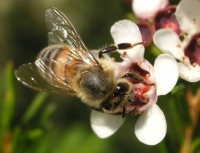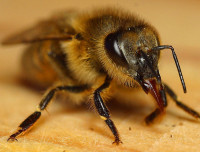
Honey bees have this other nifty little trick called pollination. Plants use the colourful cues of iridescence to make themselves attractive to bees. Bee pollination is responsible for the growth of all fruits and many vegetables as well as livestock feed – they’re real important. Humans rely on this pollination to a tune estimated at anywhere between $14 billion and $92 billion in the U.S. alone.
But things are looking grim, with hives being decimated by a disease called Colony Collapse Disorder (CCD). There have been plenty of theories as to what is causing the honey bee die-off – environmental-change related stresses, malnutrition, disease, mites, genetically modified crops, even cellphone radiation. But more and more evidence has been gathered showing pesticides to be the culprits.
France and Germany have banned a family of pesticides that are blamed for the deaths of millions of honeybees. According to Farmgeek, Gaucho (and its family of related chemicals produced by Bayer CropScience) is still widely used in NZ. This country has other threats to our honey bees in the form of varroa mite. But these threats don’t seem to be taken seriously in government.
We have learnt time and time again that the greed of corporations outweighs the greater good of the environment and health. We need to take a close look at the chemicals we use on our crops and in our gardens. We need to find better ways to manage our food supply – mass industrialisation has too many drawbacks and is placing too great a toll on our health, food supply security and the environment.
For now, I’m thrilled I’m still seeing honey bees in my garden. I’d like more. So I’m going to start investigating backyard hives. I think it’s a natural step in organic gardening. So, keep an eye out – there will be more bee stories appearing here soon…
……………………………

Also thanks to FarmGeek for the kick.
…………………………..
The European (or Western) honey bee, Apis mellifera, is the best known bee species and one of the best known of all insects. More great reading on honey bees:
Discover Magazine: 20 things you didn’t know about bees (2007)
Worldchanging: Apiculture and Colony Collapse Disorder (2007)
Plan Bee Central Blog – Save the bees with Michael Schacker
Radio NZ: Sick Bees (2009) – Download audio (10 mins)


Leave a Reply
Want to join the discussion?Feel free to contribute!